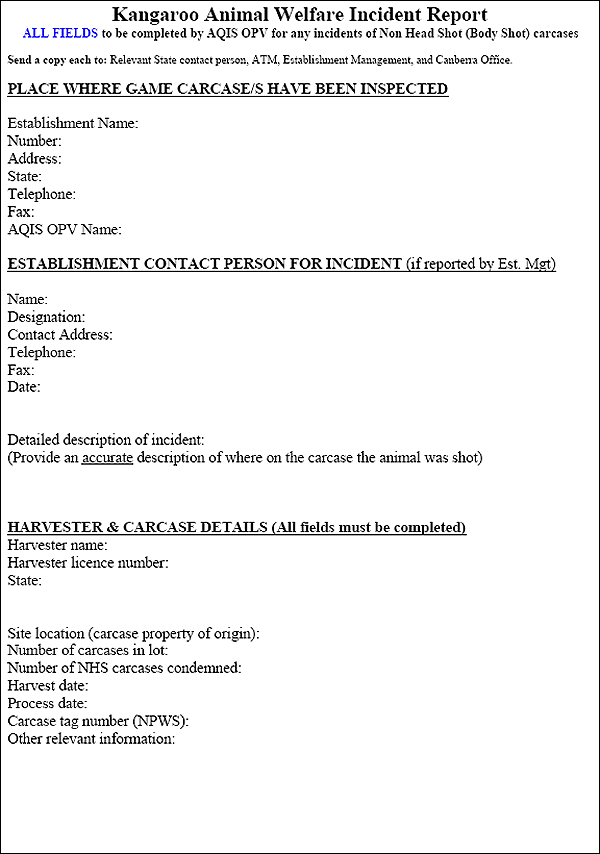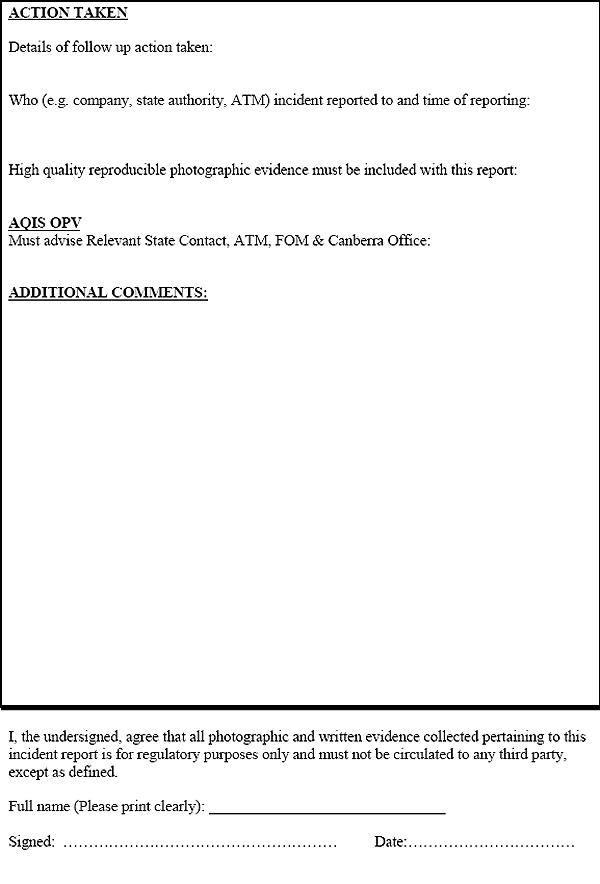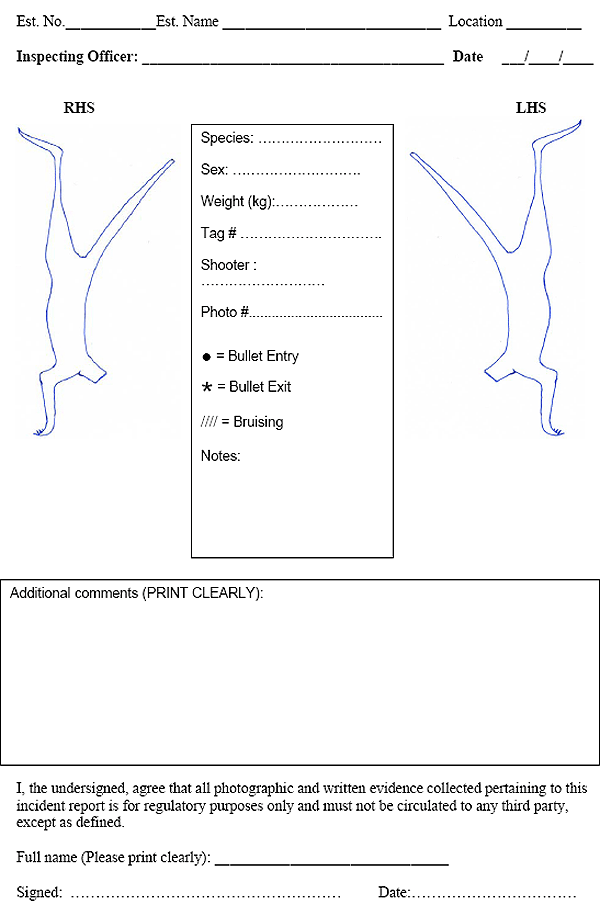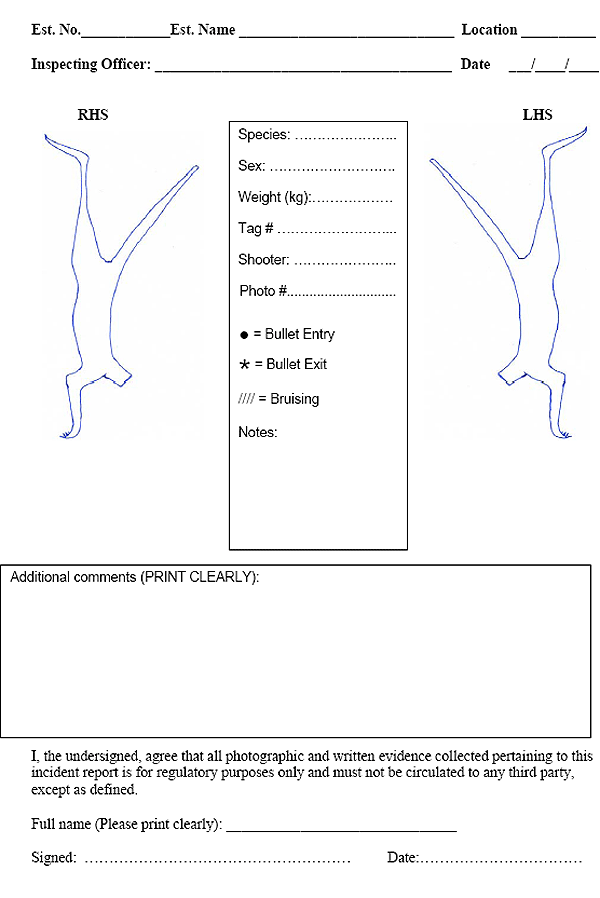NSFS Ref 10
(Last notice on this issue: 2009/01)
Date of Effect: 4 December 2009
Date of Expiry: Until further notice
Contact Officers
Carol Sheridan
National Manager
Export Meat
Phone: 02 6272 4597
Contact by email
Malcolm Fowler
Animal Welfare Incident Manager
Food Export
Phone: 02 6272 4734
Contact by email
Distribution Categories
- Central and Regional Office
- OIC Inspection Staff, Meat Establishments
- Managers, Export Game Meat Establishments
- States
Implementation Schedule
(To be completed by the On Plant Supervisor on the AQIS file copy)
- Date received:
- Date discussed with management:
- Initial implementation date:
- Date completed:
- Management Representative Initials:
- AQIS OPS initials:
1 Purpose
To advise of the mandatory procedure for reporting Non Head Shot (NHS) [or Body Shot] kangaroos at game establishments. This notice supersedes AQIS Meat Notice 2009/01.
2 Scope
This notice applies to all establishments processing field shot kangaroos for export.
3 Definitions
Kangaroo1
All species of the family Macropodidae within the super family Macropodoidea and so applies to kangaroos, wallaroos (or euros), wallabies and pademelons.
Zero Tolerance
A policy where shooters and processors are not permitted to buy and/or sell kangaroo skins or carcasses that are shot in the body.
Lot
All carcases from one shooter processed in a day.
4 Background
The humane treatment of farmed and game animals supports the acceptability of Australian meat and meat products for trade. There is increased scrutiny of the game industry by consumers, animal welfare groups and major export markets that demand and expect very high standards of animal welfare applied to animals used for food.
The Commonwealth Environmental Protection & Biodiversity Conservation Act 1999 (EPBC Act) provides a legislative basis for the conservation-oriented control of the export and imports of wildlife and wildlife products. This Act is administered by the Commonwealth Department of the Environment, Water, Heritage and the Arts (DEWHA) It is the responsibility of individual States to manage and regulate wildlife, which includes the sustainable harvest of kangaroos. States that currently have approved Kangaroo Management Plans include Queensland, Western Australia, New South Wales, South Australia and Tasmania. The plans are administered under Part 13A of the EPBC Act.
Sub-section 303FO (3) (f) of the EPBC Act relates to the welfare of animals:
"if the plan relates to the taking of live specimens that belong to a taxon specified in the regulations—the conditions that, under the regulations, are applicable to the welfare of the specimens are likely to be complied with"
The regulations require that where an animal is killed, it is done in a way that is generally accepted to minimise pain and suffering.
A meeting was held in Canberra between the State Kangaroo Managers, DEWHA and AQIS to discuss the monitoring, reporting and follow up actions with respect to game animal welfare. It was agreed that AQIS on-plant staff are strategically located at export game processing establishments to monitor the implementation of the National Code of Practice for the Humane Shooting of Kangaroos and Wallabies for Commercial Purposes (CoP) and requirements of the State Management Plans relating to zero tolerance policy. Furthermore, AQIS has a regulatory role at export registered establishments in ensuring that animal welfare requirements are in place.
5 The national code of practice for the humane shooting of kangaroos and wallabies for commercial purposes.
The State Kangaroo Management Plans are regulated under each State’s wildlife/conservation legislation. All management plans, with the exception of Tasmania, include compliance with the CoP (Attachment 1) as the minimum applicable standard. Tasmania has developed the Animal Welfare Standard for the Hunting of Wallabies in Tasmania (developed under the Animal Welfare Act 1993) which is referenced in, and attached to its Management Plan. This Standard is very similar to the CoP.
The CoP was developed cooperatively by the States and the Commonwealth to ensure that all persons intending to harvest kangaroos are aware of the standard of humane conduct required.
6 Importing country requirements
It is also the expectation of importing countries of both meat and skins that animals are treated humanely and that AQIS as the export regulator and certifier has systems in place to verify and enforce Australian and Importing Country animal welfare requirements.
7 Procedures at export registered game establishments
The establishment’s approved arrangement must cover identification, reporting and handling of NHS carcases and include the following outcomes:
7.1 All NHS carcases and carcase parts must be removed from processing either on arrival (if identifiable) or after hide removal.
7.2 All NHS carcases must be clearly identified and reported to the relevant State authority for any appropriate follow-up investigation.
7.2 Skins from NHS carcases must be condemned.
7.4 NHS carcases are NOT eligible for either human consumption or pet food production and must be condemned.
8 Responsiblities and reporting requirements
8.1 Establishment Management
The establishment’s approved arrangement must also cover reporting requirements as regards to non-compliance with the CoP and zero tolerance policy, including the following:
8.1.1 Develop and implement an incident reporting system ensuring that all NHS carcases are appropriately identified and reported to the relevant State Authority (see Appendix 1) and AQIS On-Plant Veterinarian (OPV).
- The State authorities may require additional information and/or evidence, for example photos, retention of carcases and skins, etc.
8.1.2 The incident reporting system must also include feedback to the shooters/harvesters/chiller box operators as applicable and appropriate.
8.1.3 Liaise with AQIS OPV and fill out the incident report (for each animal welfare (AW) compromised lot daily) as per Appendix 2 (which sets a guideline for information that may be required by the States for follow up).
8.1.4 Document actions taken and maintain appropriate records which will be available for AQIS audit/scrutiny.
8.2 State Authorities Responsible for Macropod Management have agreed to:
8.2.1 Provide game processing establishments and AQIS with guidance for reporting and advice on any additional information required.
8.2.2 Take appropriate follow up action on reports received from establishment management and/or AQIS.
8.2.3 Where evidence is provided for animals shot interstate, but processed at establishment located in the State, liaise with and take appropriate follow up action with the interstate counterparts.
8.2.4 Provide feedback to AQIS personnel (OPV/Area Technical Manager (ATM)/Field Operations Manager (FOM), Canberra Office) and establishment management on the progress/outcome of investigations taken.8.3 On-Plant Veterinarian
8.3.1 Advise establishment management of any NHS carcases (if missed by establishment operators)
8.3.2 In consultation with the ATM, assess and approve the establishment’s animal welfare incident reporting system.
8.3.3 In consultation with the ATM, complete all fields of the animal welfare incident report, as per Appendix 2, if the establishment has not effectively addressed the issue through their Approved Arrangement (AA).
- For example, where the establishment fails to follow correct reporting procedures, complete an incident report for each AW compromised lot of carcases processed daily as per Appendix 2.
8.3.4 Notify the relevant State Authority within 3 working days (preferably within 24 hours) of any non-compliance being identified.
8.3.5 Retain the carcase(s) under appropriate control at the request of relevant State Authority to ensure it retains its identity, security and is not a source of contamination to other carcases.
8.3.6 Provide an electronic copy of any reports received by management (as per 8.1.1) or generated as per 8.3.3 each to:
- establishment management (in case of reports per 8.3.3)
- ATM
- relevant State Authority (Appendix 1)(in case of reports per 8.3.3 and 8.3.4)
- AQIS Canberra Office8.3.7 Take photographs of NHS carcases as appropriate (utilising digital cameras supplied by Dubbo Store).
- Ensure that all photographs taken have the harvester and carcase tags clearly visible and can be clearly reproducible when the report is transmitted by email or print.
- For consistency photos should be named and saved using the following protocol: Establishment number, lot number, tag number, title and the date (e.g. Est0999_Lot 22_X12345_NHS_stomach_ yyyymmdd), and attach to the incident report.
- AQIS staff are reminded that photographic and written evidence collected for the incident reports are for regulatory purposes only and must not be circulated to any other third party.
8.3.8 Monitor and record any animal welfare incidents and any failure to report (as per 8.1.1) through the National Establishment Verification System (NEVS) Form 4, including actions taken by the company and communicate with, including providing appropriate feedback to, the ATM and the company.
8.3.9 Audit the establishment’s reporting system (e.g. feedback as per 8.1.2) at regular intervals and request corrective action/s as required if the system is non-compliant.
8.4 Area Technical Manager
8.4.1 Assess and approve the establishment’s AA as regards to animal welfare reporting and actions taken.
8.4.2 Follow up any incidents with management and verify actions taken eg. Feedback to shooters, reports sent to State Authorities, etc.
8.4.3 During routine monthly audits assess carcases for compliance with animal welfare requirements. Non-conformances must be recorded in NEVS Form 4.
8.4.4 Provide feedback to OPV and FOM.
Carol Sheridan
National Manager Export Meat
Food Exports Division
Biosecurity Services Group
References
1. Australian Standard for the Hygienic Production of Game Meat for Human Consumption AS4464: 1997. Available: http://www.publish.csiro.au/nid/18/pid/422.htm. Accessed 19/06/09.
2. National Code of Practice for the Humane Shooting of Kangaroos and Wallabies for Commercial Purposes (2008). Available: Department of the Environment Accessed 19/06/09.
3. Environment Protection and Biodiversity Conservation (Commonwealth) Act 1999. Available: Volume 1: http://www.frli.gov.au/ComLaw/Legislation/ActCompilation1.nsf/0/863E4E04096B1D5ACA25728F001D3647/$file/EnvProtBioDivCons99Vol1WD02.pdf. Accessed 11/12/07.
4. Environment Protection and Biodiversity Conservation (Commonwealth) Act 1999. Available, Volume 2: http://www.frli.gov.au/ComLaw/Legislation/ActCompilation1.nsf/0/6853E3291B474121CA25728F001A7877/$file/EnvProtBioDivCons99Vol2WD02.pdf. Accessed 11/12/07.
5. Management Plan for the Commercial Harvest of Kangaroos in Western Australia 2008 – 2012. Available: Department of the Environment. Accessed 19/06/09.
6. Wildlife Trade Management Plan for the Commercial Harvest of Bennett’s Wallabies and Tasmanian Pademelons on Flinders Island, Tasmania 2005 to 2010. Available: Department of the Environment. Accessed 19/06/09.
7. Wildlife Trade Management Plan for the Commercial Harvest of Bennett’s Wallabies on King Island, Tasmania 2005 to 2010. Available: Department of the Environment. Accessed 19/06/09.
8. The Kangaroo Conservation and Management Plan for South Australia 2008 – 2012. Available: Department of the Environment. Accessed 19/06/09.
9. Queensland Wildlife Trade Management Plan for Export – Commercially Harvested Macropods, 2008 – 2012. Available: Department of the Environment. Accessed 19/06/09.
10. New South Wales Commercial Kangaroo Harvest Management Plan 2007 – 2011. Available: http://www.environment.nsw.gov.au/wildlifemanagement/KangarooManagementProgram.htm. Accessed 10/08/09.
Appendix 1: State Contact Details for Reporting Kangaroo Animal Welfare Incidents
|
State |
Contact Person & Address |
Phone & email contact |
|---|---|---|
| QLD | Mr Andrew Lewis Manager (Macropod Unit) Western Region Regional Services, Environmental Services, Department of Environment and Resource Management PO Box 149 Charleville QLD 4470 |
Phone: 07 4654 4716 Fax: 07 4654 1418 Email: andrew.lewis@derm.qld.gov.au |
| NSW | Ms Nicole Payne Manager, Kangaroo Management Program Department of Environnent, Climate Change and Water PO Box 2111 Dubbo NSW 2830 |
Phone: 1300 173 376 Fax: 02 6884 8675 Mobile: 0429 834 370 Email: nicole.payne@environment.nsw.gov.au or kangaroo.management@environment.nsw.gov.au |
| VIC | Mr Tony Britt Manager, Animal Standards Department of Primary Industries PO Box 2500 Bendigo DC VIC 3554 |
Phone: 03 5430 4512 Fax: 03 5430 4520 Mobile : 0408 843 163 Email: tony.britt@dpi.vic.gov.au |
| TAS | Mr Kris Carlyon Wildlife Policy Officer Department of Primary Industries, Parks, Water and Environment, GPO Box 44 Hobart TAS 7001 |
Phone: 03 6233 8978 Fax: 03 6233 3477 Email: kris.carlyon@dpipwe.tas.gov.au |
| SA | Mr Tom Gerschwitz, Operations Manager, Kangaroo Management, Department for Environment and Heritage, PO Box 78 Port Augusta SA 5700 |
Phone: 08 8648 5319 Fax: 08 8648 5301 Email: gerschwitz.tom@saugov.sa.gov.au |
| WA | Mr Peter Lambert Regional Compliance Coordinator Department of Environment and Conservation Locked Bag 104 Bentley Delivery Centre WA 6983 |
Phone: 08 9334 0289 Email: Peter.Lambert@dec.wa.gov.au |
Appendix 2: Guidelines for Kangaroo Animal Welfare Incident Reporting




1National code of Practice for the Humane Shooting of Kangaroos and Wallabies for Commercial Purposes
